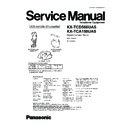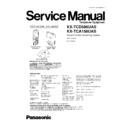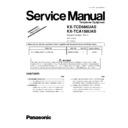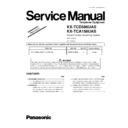Read Panasonic KX-TCD566UAS / KX-TCA158UAS Service Manual online
KX-TCD566UAS
KX-TCA158UAS
KX-TCA158UAS
Digital Cordless Phone
Silver Version
(for Ukraine)
Telephone Equipment
ORDER NO. KM40407491C3
1 ABOUT LEAD FREE SOLDER (PbF: Pb free)
4
1.1. Suggested PbF Solder
4
1.2. How to recognize that Pb Free solder is used
5
2 FOR SERVICE TECHNICIANS
7
3 CAUTION
7
4 BATTERY
8
4.1. Battery Installation
8
4.2. Battery Charge
8
4.3. Battery Life
9
4.4. Battery Replacement
9
5 LOCATION OF CONTROLS
10
5.1. Base Unit
10
5.2. Handset
10
5.3. Charger
11
6 SETTINGS
12
6.1. Connections
12
6.2. Ringer Volume
13
6.3. Guide to Settings
14
6.4. PIN Code
16
6.5. Reset
17
6.6. Key Lock
19
6.7. R Button to Use the Recall Feature
19
6.8. Pause Button (for PBX/Long Distance Service Users)
19
6.9. Call Restriction
19
6.10. Call BAR On/Off (Call Prohibition On/Off)
20
6.11. Selecting the Display Language
20
6.12. Selecting the Recall Mode
20
6.13. Selecting Category Private Colours
20
6.14. Vibration Feature
21
6.15. Auto Voice Dial On/Off
21
6.16. Setting Dialling Mode (Tone/Pulse)
21
6.17. ARS (Automatic Route Selection)
22
7 DISPLAY
23
7.1. Display Icons
23
7.2. Menu Icons
23
7.3. Caller ID Display
23
7.4. Before Requesting Help (Troubleshooting)
24
8 OPERATIONS
26
8.1. Power ON/OFF
26
8.2. Setting the Date and Time
26
8.3. Redialling
26
8.4. Phonebook
27
8.5. Registering a Handset to a Base Unit
31
8.6. Selecting a Base Unit
32
9 DISASSEMBLY INSTRUCTIONS
33
9.1. Base Unit
33
9.2. Handset
34
9.3. Charger Unit
35
10 TROUBLESHOOTING GUIDE
36
10.1. Check Power
37
10.2. Check Battery Charge
39
10.3. Check Link
41
10.4. Check Handset Transmission
44
10.5. Check Handset Reception
44
10.6. Check Caller ID
44
10.7. Bell Reception
45
11 CHECK PROCEDURE (BASE UNIT)
46
11.1. Preparation
46
11.2. PC Setting
46
12 CHECK PROCEDURE (HANDSET)
47
12.1. Preparation
47
12.2. PC Setting
47
13 ADJUSTMENTS (BASE UNIT AND CHARGER UNIT)
48
13.1. Adjustment (Base Unit)
48
13.2. Adjustment Standard (Base Unit)
52
13.3. Adjustment (Charger Unit)
54
13.4. Adjustment Standard (Charger Unit)
54
14 ADJUSTMENTS (HANDSET)
55
14.1. Adjustment (Handset)
55
14.2. Adjustment Standard (Handset)
58
15 RF SPECIFICATION
59
15.1. Base Unit
59
Note:
Because CONTENTS 4 to 8 are the extracts from the Operating Instructions of this model, they are subject to change without
notice. Please refer to the original Operating Instructions for further information.
notice. Please refer to the original Operating Instructions for further information.
CONTENTS
Page
Page
2
KX-TCD566UAS / KX-TCA158UAS
15.2. Handset
59
16 HOW TO CHECK THE HANDSET SPEAKER
59
17 HOW TO CHECK THE HANDSET RECEIVER
60
18 FREQUENCY TABLE (MHz)
61
19 BLOCK DIAGRAM (BASE UNIT)
62
20 CIRCUIT OPERATION (BASE UNIT)
63
20.1. Outline
63
20.2. Power Supply Circuit
64
20.3. Telephone Line Interface
65
20.4. Transmitter/Receiver
65
20.5. Pulse Dialing
65
21 BLOCK DIAGRAM (HANDSET)
66
22 CIRCUIT OPERATION (HANDSET)
67
22.1. Outline
67
22.2. Power Supply Circuit/Reset Circuit
67
22.3. Charge Circuit
67
22.4. Battery Low/Power Down Detector
68
22.5. Speakerphone and Headset Jack
68
23 BLOCK DIAGRAM (RF MODULE)
69
24 CIRCUIT OPERATION (CHARGER UNIT)
70
25 SIGNAL ROUTE
71
26 CPU DATA (BASE UNIT)
72
26.1. IC2 (BBIC)
72
27 CPU DATA (HANDSET)
74
27.1. IC201 (BBIC)
74
28 EEPROM LAYOUT (BASE UNIT)
76
28.1. Scope
76
28.2. Introduction
76
28.3. EEPROM Layout
76
29 EEPROM LAYOUT (HANDSET)
81
29.1. Scope
81
29.2. Introduction
81
29.3. EEPROM contents
81
30 HOW TO REPLACE FLAT PACKAGE IC
83
30.1. Preparation
83
30.2. Procedure
83
30.3. Modification Procedure of Bridge
83
31 CABINET AND ELECTRICAL PARTS LOCATION (BASE UNIT)
84
32 CABINET AND ELECTRICAL PARTS LOCATION (HANDSET) 85
33 CABINET AND ELECTRICAL PARTS LOCATION (CHARGER
UNIT)
86
34 ACCESSORIES AND PACKING MATERIALS
87
34.1. KX-TCD566UAS
87
34.2. KX-TCA158UAS
88
35 TERMINAL GUIDE OF THE ICs, TRANSISTORS AND DIODES
89
35.1. Base Unit
89
35.2. Handset
89
35.3. Charger Unit
89
36 REPLACEMENT PARTS LIST
90
36.1. Base Unit
90
36.2. Handset
92
36.3. Charger Unit
94
36.4. Accessories and Packing Materials
94
36.5. Fixtures and Tools
95
37 FOR SCHEMATIC DIAGRAM
97
37.1. Base Unit (SCHEMATIC DIAGRAM (BASE UNIT))
97
37.2. Handset (SCHEMATIC DIAGRAM (HANDSET))
97
37.3. Charger Unit (SCHEMATIC DIAGRAM (CHARGER UNIT))
97
38 SCHEMATIC DIAGRAM (BASE UNIT)
98
39 SCHEMATIC DIAGRAM (HANDSET)
100
40 SCHEMATIC DIAGRAM (RF MODULE)
102
41 SCHEMATIC DIAGRAM (CHARGER UNIT)
103
42 CIRCUIT BOARD (BASE UNIT)
105
42.1. Main
105
42.2. Page Switch
107
43 CIRCUIT BOARD (HANDSET)
109
43.1. Component View
109
43.2. Flow Solder Side View
110
44 CIRCUIT BOARD (CHARGER UNIT)
111
44.1. Component View
111
44.2. Flow Solder Side View
111
3
KX-TCD566UAS / KX-TCA158UAS
1 ABOUT LEAD FREE SOLDER (PbF: Pb free)
Note:
In the information below, Pb, the symbol for lead in the periodic table of elements, will refer to standard solder or solder that
contains lead.
contains lead.
We will use PbF solder when discussing the lead free solder used in our manufacturing process which is made from Tin (Sn),
Silver (Ag), and Copper (Cu).
Silver (Ag), and Copper (Cu).
This model, and others like it, manufactured using lead free solder will have PbF stamped on the PCB. For service and repair
work we suggest using the same type ofsolder although, with some precautions, standard Pb solder can also be used.
work we suggest using the same type ofsolder although, with some precautions, standard Pb solder can also be used.
Caution
•
•
•
•
PbF solder has a melting point that is 50°F ~70°F (30°C ~ 40°C) higher than Pb solder. Please use a soldering iron with
temperature control and adjust it to 700°F ± 20°F (370°C ± 10°C). In case ofusing high temperature soldering iron, please
be careful not to heat too long.
temperature control and adjust it to 700°F ± 20°F (370°C ± 10°C). In case ofusing high temperature soldering iron, please
be careful not to heat too long.
•
•
•
•
PbF solder will tend to splash ifit is heated much higher than its melting point, approximately 1100°F (600°C).
•
•
•
•
Ifyou must use Pb solder on a PCB manufactured using PbF solder, remove as much ofthe original PbF solder as possible
and be sure that any remaining is melted prior to applying the Pb solder.
and be sure that any remaining is melted prior to applying the Pb solder.
•
•
•
•
When applying PbF solder to double layered boards, please check the component side for excess which may flow onto the
opposite side (See the figure below).
opposite side (See the figure below).
1.1.
Suggested PbF Solder
There are several types ofPbF solder available commercially. While this product is manufactured using Tin, Silver, and Copper
(Sn+Ag+Cu), you can also use Tin and Copper (Sn+Cu) or Tin, Zinc, and Bismuth (Sn+Zn+Bi). Please check the
manufacturer’s specific instructions for the melting points of their products and any precautions for using their product with other
materials.
(Sn+Ag+Cu), you can also use Tin and Copper (Sn+Cu) or Tin, Zinc, and Bismuth (Sn+Zn+Bi). Please check the
manufacturer’s specific instructions for the melting points of their products and any precautions for using their product with other
materials.
The following lead free (PbF) solder wire sizes are recommended for service of this product: 0.3mm, 0.6mm and 1.0mm.
4
KX-TCD566UAS / KX-TCA158UAS




